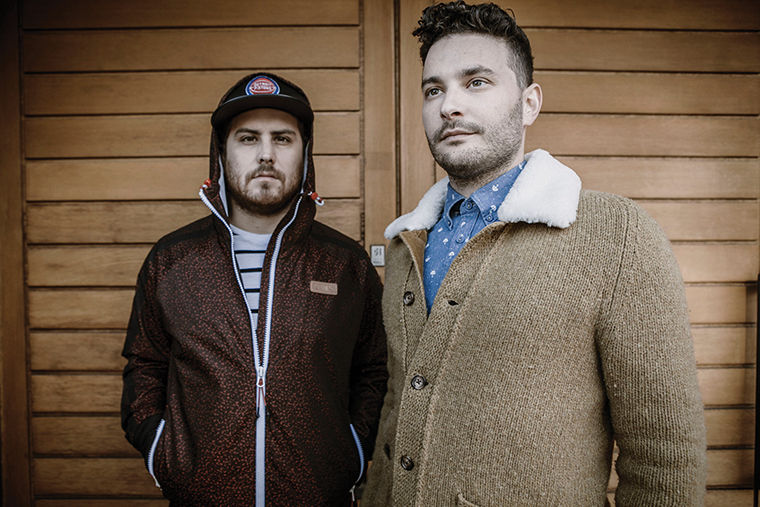Detroit’s Dale Earnhardt Jr. Jr. turn funs into funky
Photo Courtesy of Warner Bros. Records
Daniel Zott and Josh Epstein make up half of Dale Earnhardt Jr. Jr., a band quickly making a name for itself as one of indie music’s rising acts, thanks to its catchy songs.
November 24, 2014
Through its infectious beats and synth-pop style, Detroit-based Dale Earnhardt Jr. Jr. is becoming one of indie music’s most prolific rising stars. With members Daniel Zott, Joshua Epstein, Mike Higgins and Jon Visger, the band has quickly made a name for itself—one that may be familiar to NASCAR fans as well—with its first two albums: 2011’s It’s A Corporate World and 2013’s The Speed of Things.
Originally a basement side-project for founding members Zott and Epstein, it was not long before the two realized they were on to something special. The two Detroit musicians previously knew of each other, but it was not until the duo wrote and recorded the band’s single “Simple Girl” in one day in 2010 that they decided to make something of the collaboration. After they performed at CMJ in 2010 and caught the eye of Warner Bros. Records, they realized Dale Earnhardt Jr. Jr. could actually make it big. What followed is the group’s massive success in the indie scene.
The Chronicle spoke with lead singer and guitarist Zott about thriving in Detroit’s legendary music scene, dealing with recent success and putting on a show.
THE CHRONICLE: Why the name Dale Earnhardt Jr. Jr.?
DANIEL ZOTT: We wanted a name that’d give us freedom to do anything. We came up with weird names like Counting Crows Pt. 2. Then a buddy of Josh’s said, “That name is so horrible, you might as well just call it Dale Earnhardt Jr. Jr.” And that is how it happened.
Has Dale Earnhardt Jr. ever contacted the band about the name?
DZ: We wrote to [Dale Earnhardt Jr.] and he wrote us back saying, “Good luck on the road. I’m not [going to] come after you. Guys have been teasing me about the name, but I like the music.” He was really supportive, which made it even better.
How has success affected the band?
DZ: We’re always so driven, there’s always more to do. If we have some more success, we’ll have a bigger platform and be able to do more creative ideas that we normally can’t pull off. It gives you some credence to be more creative, and that’s what we’ve used it for.
How has Detroit’s creative culture influenced the band?
DZ: Detroit has such a rich history. You’ve got Motown, the White Stripes, Eminem and MC5. It’s just a bedrock of music. It gives us a lot of pride and drive to be the best and to think big. If you make it in Detroit, you’ve made it. Even if nobody knows you in any other city, you think you’re something. Teaming up with Josh, it’s given us a much wider perspective, like, “We need to not just be selling out shows in Detroit or having decent shows in Detroit. I want the most people to hear my music as possible.” Detroit’s a great community, where you feel like you could do anything, but you can get wrapped up in the community too. But I think the scene [in Detroit] is really interesting because it’s spread out and you can get a mix of everything.
How would you describe the band’s distinctive style?
DZ: Lately, our style has been a bit more like hip-hop/rock. I don’t mean that like rapping over rock, but more in the sense that the beat in the music is equally as important as the lyrics and the melody. It’s important to have a certain feel in your body when you hear our music. I say it’s like hip-hop/folk, where the message is important but there’s also a good feel to the music, because I always love making beats, and that’s something we incorporate into all our songs.
What is the your band’s songwriting process like?
DZ: We don’t try to restrict how the idea is going to come about. In any way, shape or form that it comes, we let it grow and become something better. But it’s different every time, almost.
Why is a great live performance important to you?
DZ: People pay $15 [to see us], which costs more than an album usually. If they come out, we have to give them something more than that. That’s why we put a special emphasis on it being a show. When you strip it down, we’re entertainers. We’re song and dance men, like Bob Dylan would say. I’m up there as a song and dance man. I’m not up there to press play and have my album play. You have to be an extrovert when you’re out on stage and an introvert when you’re in the studio.








